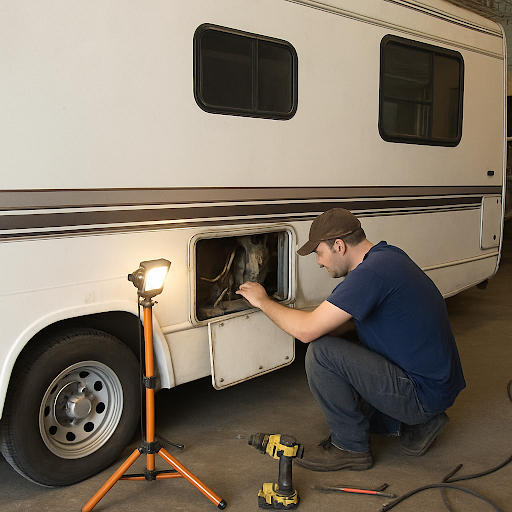RVs are a significant investment, and as with any large purchase, considering the potential costs of repairs and maintenance is crucial. It makes sense, then, that RV extended warranties are frequently talked about in the traveling community. For years, warranty companies have offered different policies with different levels of coverage and varying customer service. A recurring concern among RVers is determining the value of an extended RV warranty.
With so much information available, it can be tough to get an answer to the most fundamental question: is an RV warranty worth it?
In this post, we explain the benefits, limitations, and best practices when it comes to securing reliable warranty coverage.
What is RV warranty coverage?
Before you can decide if an RV warranty is worth it for you, you’ll need a good understanding of what this vehicle protection product is.
What is most often referred to as an RV extended warranty is actually an RV extended service contract. This is because the term “warranty” implies a connection to the coach’s original manufacturer warranty.
With this in mind, “RV warranty” is the most commonly used term when describing these policies, so we’ll use them interchangeably throughout this post.
Types of RV Warranties
- Manufacturer’s Warranty: This typically covers defects and issues that arise within the first year of ownership, though some parts of your RV may be covered for more time.
- Extended RV Warranty: Purchased separately, these warranties offer coverage beyond the manufacturer’s period, often including more comprehensive protection.
The purpose of an RV extended warranty is to cover the cost of electrical and mechanical breakdowns that occur with your rig. These policies will always exclude common maintenance items, aesthetic damages, and any issues caused by collisions.
RV warranty policies come with a deductible, a clearly defined list of what will and will not be covered by the contract, and a term based on the model year and mileage on your vehicle.
Pros of Coverage: Why an RV Warranty is Worth it
With an extended RV warranty, you can protect your budget from the costs of unexpected RV repairs.
Financial Protection
This benefit becomes increasingly important as motorhomes become more complex. With new features, updated technology, and high-tech appliances, your home-on-wheels is more vulnerable than ever to costly breakdowns. An extended warranty helps mitigate these expenses, providing financial peace of mind. For many RV owners, it is more simple to get ahead of the unknown by locking in coverage, rather than waiting around for the inevitable trip to the repair shop.
The first thing you should look for when purchasing a warranty is what components will and will not be covered. Typically, there are two types of policies that will cover different items: comprehensive and exclusionary.
A comprehensive RV warranty policy will list everything that is covered, if the failure isn’t on this list, it will be denied. The higher level of coverage, called an exclusionary policy, will list every component that is not covered. If the issue your rig is facing is not specifically excluded, it will be covered.
With reliable warranties, both policy types will include protection for things like your engine, transmission, and drive axle components. These coverages can also extend to everyday items like your refrigerator, electronics, generator, and slide-outs.
The higher-level coverage you purchase, the more components your policy will include.
Your extended RV warranty will continue to benefit your wallet if you decide to sell your rig. Should you need this change during the life of the policy, the contract can provide extra value to the prospective new owner. When you have an RV warranty on your rig, it suggests the vehicle was well maintained and repaired when needed, not to mention the value-add of any remaining coverage that can be transferred to the buyer.
Convenience
With an RV warranty, you have access to any licensed repair facility in the US or Canada. This means you won’t have to worry about hitting a specific repair shop, but can take your RV in or have someone come out to you at your own convenience.
Customer Support
Plus, with a provider like Wholesale Warranties, you have access to your RV warranty specialist and a customer support team. 90% of our claims are adjusted on the first phone call, and we’re here to walk you through every step of the way. In a big way, the answer to “is an RV warranty worth it?” depends on how easy it is to use! Filing a claim should be a simple process that takes as much stress out of a breakdown as possible. Be sure to work with a company known for hassle-free claims.
Cons of an RV Warranty
The value of coverage is subjective, and will rely heavily on your RV lifestyle, desired level of risk, and budget. It will also depend on the policy and provider you choose to go with. But coverage won’t be the right fit for everyone. Here are some cons to RV warranties:
Cost
The reality is, protection is an upfront cost. Some travelers believe their eventual repairs will be lower than the cost of coverage, and will choose to self-insure. Others believe an RV warranty is worth it purely for the peace of mind, knowing that if the worst happens and they need a $70,000 engine repair, their budget is protected.
Coverage and Provider Limitations
Not all warranty plans are created equal. It is imperative that you understand the policy you’re looking to purchase, including what is and is not covered. Some providers may not cover wear and tear, may have waiting periods, or may exclude certain parts or types of failures. To avoid unexpected out-of-pocket expenses and determine if the RV extended warranty you’re looking at is worth it, read the fine print before signing or paying for a contract.
You should note that an RV warranty will never cover pre-existing issues or components that are damaged due to an accident or physical damage. Warranty policies are also designed to cover electrical and mechanical components, and will, therefore, exclude aesthetic items such as upholstery, mirrors, sheet metal, glass, bedding and cabinetry.
Additionally, extended RV warranties will require the contract holder to properly maintain their RV based on manufacturer specifications. You’ll need to keep records of these tasks for any future claims.
In order to qualify for coverage, the vehicle must meet defined eligibility requirements. Eligibility is based on a few different factors, such as model age, type, and mileage. Most reputable warranty providers will not cover vehicles older than 20 model years or provide engine coverage for vehicles over 100,000 miles. These caps vary depending on the provider.
What’s the risk of an RV failure?
The probability of facing a major mechanical failure while traveling is shockingly high, even for new RVs.

In fact, 3 out of every 10 RVs will suffer a breakdown by only their 2nd year on the road. This statistic jumps to a whopping 8 out of 10 RVs by their 5th year, and nearly EVERY RV by their 8th year in service.
New or used, motorhome or towable, the fact of the matter is that your RV will experience a break down.
So we know there’s a high risk of suffering a failure, but do the repair costs justify investing in RV warranty coverage? As of 2019, RV repair and claim data reveals the average cost of a typical RV repair is $300 per hour between parts and labor. Since then, the price of parts and labor has only increased.
This comes in at a significant increase, most likely due to modern RVs requiring a higher level of skill for repair. Check out the image below for a closer look at some of the most common RV breakdowns and their average costs:
How to Find a Reliable Coverage Provider
Now that you know the benefits and limitations of an extended RV warranty, you’ll need to know how to determine a reliable provider.
Most of the negative reviews on RV warranties stem from misinformation and poor customer service from the policy provider. To ensure you’re investing in a good warranty with a reputable company, follow these steps:
1) Ask for a copy of the policy up front. You should have the opportunity to do full and accurate research on your own. If the salesperson you are working with is not willing to show you an exact copy of the warranty, it could mean they are misrepresenting the policy they’re selling.
2) Research the seller online. Online reviews are an easy way to understand the provider’s reputation in the RV community. Check the prospective company’s score on the Better Business Bureau, Google and Trustpilot reviews, as well as reviews on popular RV forums such as iRV2.com. The experiences of real RVers who have used the policy can help determine if the provider is right for you.
3) Only purchase a fully-insured warranty. Only purchase policies backed by large, financially stable insurance carriers. If the warranty provider and administrator were to go out of business, an insurance backer would step in to pay for any claims you may have. Without this added layer of support, you could be left with a pricey RV warranty that isn’t worth the paper it’s written on.
Purchasing an RV warranty is a personal decision, but you owe it to yourself to know your options. Education is key, and the purpose of this article is to ensure you are armed with the knowledge to make an informed financial decision.
The high costs of modern RV repairs coupled with the high chance of breakdowns make an RV warranty a worthwhile purchase, and an important investment to protect your travel budget. A contract purchased from a fairly priced, reliable provider is the ultimate peace of mind for RV travelers.
So, is an RV warranty worth it?
Whether an RV warranty is worth the investment depends on several factors:
- Age and Condition of the RV: does your RV qualify for coverage, or even preferred rates? Is anything currently broken or ineligible for protection?
- Travel Frequency: If you frequently travel or use your RV as a primary residence, a warranty might offer substantial value.
- Budget: will your RV travel budget be blown by unexpected repairs?
- Personal Risk Tolerance: Consider your comfort level with potential repair costs and your financial ability to handle unexpected expenses.
In conclusion, an RV extended warranty can be a valuable safety net for some, while others may find it unnecessary. Carefully assess your individual needs, usage patterns, and financial situation before making a decision. Doing so will ensure that your choice aligns with your lifestyle and budget.
Get a free quote for an RV Extended Warranty today.
Is it worth getting an RV warranty for a new RV?
Newer RVs often come with manufacturer warranties, so an RV extended warranty will be additional coverage. However, these policies will be offered at premium prices, and will fill gaps in coverage left behind by some manufacturer plans.
What should I consider before buying an RV warranty?
Assess factors such as the age and condition of your RV, how often you travel, your financial situation, and your risk tolerance for unexpected repair expenses.
What is the average cost of an RV extended warranty?
RV warranty plan costs vary widely based on factors such as level of coverage and deductible, as well as RV types such as motorhome vs. towable, make, model, age, value, mileage and more.




